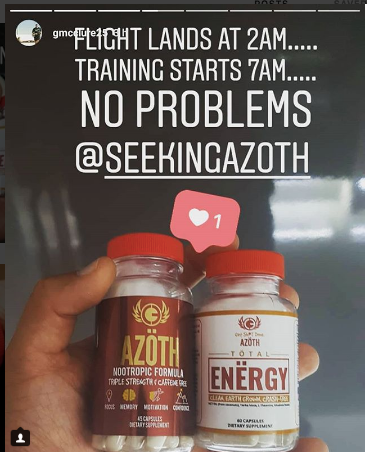By Robert Schinetsky

What if I told you that you could experience enhanced focus, greater mental clarity, elevated mood, and superior recall? What if I also told you that these traits could be obtained without any illicit psychedelics that could potentially harm you, or get you a considerably long prison sentence?
You’d probably think we are full of it….And you’d be wrong.
Science has uncovered a bevy of brain-boosting ingredients that can improve all facets of cognitive function and support cognitive health into your golden years. These wonder ingredients are called nootropics, and if you haven’t been dabbling with at least one or two of these compounds, once you read what we’ve got to say about them, you’ll be racing out to grab your own!
What are Nootropics?
Nootropics are a class of compounds also commonly referred to as “smart drugs”. While this might be a new term for many of you reading this, the truth is, that nootropics have been around for decades, and a few of them have been around for centuries! It’s only recently that nootropics have come into the limelight as they’re being adopted by everyone from athletes to movie stars and even high-level executives on Wall Street.
The reason nootropics are called “smart drugs” is that they enhance all aspects of brain function, and certain nootropics even offer neuroprotective benefits, helping stave of mental decline that can occur as a result of aging or exposure to toxins. Essentially, think of nootropics as compounds that ignite your neurological pathways that improve your creativity, thinking, memory, learning, and mental processing all while protecting those abilities from the evil forces of your external environment.
Sounds pretty awesome, doesn’t it? They are, trust us. But, you’re probably wondering exactly how nootropics do what they do. So, let’s take a look at that now.
How Do Nootropics Do What They Do?
Given the cognitive spark that certain nootropics deliver, you probably think they’re a lot like stimulants, such as caffeine, which is a dual nootropic/stimulant compound that improves energy, focus, and alertness. But not all nootropics are stimulants in the traditional sense in that they increase mental alertness and affect cardiovascular markers (blood pressure, heart rate, etc). Some nootropics are only neuro activating, while not impacting the heart or blood flow at all. Another big difference between nootropics and stimulants is that stimulants then to have only very acute (immediate, short-lived) effects, and when the “buzz” wears off, you feel depleted, sluggish, and drained.
Nootropics, on the other hand, can deliver both short-term effects as well as prolonged benefits that actually get more effective the longer you use them. Unfortunately, nootropics won’t automatically boost your IQ by 10 points or make you score a 1600 on the SAT. But, nootropics do exert profound effects on your cognitive function through a variety of mechanisms, including:
- Increased production of important neurotransmitters, hormones, and enzymes
- Improved neural plasticity
- Reduced neuroinflammation
- Enhanced cerebral blood flow
- Fortified connection and communication between synapses
- Decreased accumulation of β-amyloid, which can cause dementia
These actions just begin to scratch the surface of how nootropics work in the body. In truth, there are a vast number of nootropics, each working a bit different than the next, which makes it hard to provide a brief, high-level description of how nootropics work. But, just know that they work through a variety of mechanisms in the body all with the goal of improving, enhancing, and preserving cognitive function. In future articles, we’ll dial down into the specific mechanisms each nootropic uses to boost your brain.
Are Nootropics Really That Important?
Nootropics are a supplement after all, so it’s only natural for you to wonder if they’re a necessity or important long term. Consider this…
The brain contains over 100 billion neurons that form an intricate network linked together by synapses.[2] These neurons communicate to each other using neurochemicals called neurotransmitters.
Certain nootropics, such as Alpha GPC or L-Tyrosine, increase production of these neurotransmitters (including acetylcholine, dopamine, epinephrine, etc.), which improve mental processing speed, memory, attention, learning, alertness, and reaction time. Used continuously, the resting levels of these critical neurotransmitters are elevated, which staves off mental decline and promotes greater cognitive function. So, when you consider things from that perspective, nootropics aren’t only important, they’re essential! But there’s more…
Other nootropics support cognitive health and accelerate cognitive function by increasing cerebral blood flow, which provides greater amounts of oxygen, glucose, and other essential nutrients the brain needs to function optimally.
Remember, glucose is the preferred source of energy for the brain[1], so compounds that can provide our brain with more of the essential stuff it needs, is awesome!nutrient, and glucose delivery which is incredibly beneficial for the brain. Plus, another added benefit of increased blood flow, is better memory and focus, which improves your ability to work or ace that final exam!
Finally, nootropics also serve as an “enforcer” of sorts that protects, defends, and preserves brain tissue against free radicals, B-amyloid, and inflammation, all of which contribute to accelerated aging and increase the chances of developing certain neurological diseases, such as Alzheimer’s or Parkinson’s. Nootropics can remove free radicals and reduce inflammation, which retards the aging process, and preserves cognitive function long into retirement age.
Benefits of Nootropics
Here’s a list of the numerous benefits you stand to gain from regular use of nootropics:
- Increased focus & motivation
- Improved cognition
- Better memory formation
- Reduced mental fatigue
- Improved cognitive health
- Decreased inflammation
- Improved reaction time
- Greater mental clarity
- Heightened mood
- Reduced stress
- Increased alertness
- Enhanced creativity
When you really start to understand what nootropics have to offer, it’s a no-brainer why they’re so popular these days, and a big reason you’re starting to see them included in everything from energy drinks to pre workouts, and before long, they’ll probably be part of your daily multi-vitamin!When it comes to nootropics, here’s a couple things to remember
- Certain nootropics require daily use to realize their benefits
- Nootropics, unlike stimulants, don’t typically come with the rapid tolerance build up, and actually increase efficacy the longer you use them.
Top 10 Nootropics
Have you ever walked down the vitamin aisle at the grocery store and thought: “Holy cow, that’s a lot of different vitamins! How many can there really be?!”As expansive as the vitamin aisle may seem, that’s how much bigger the world of nootropics is, and it’s only going to increase as researchers continue to learn more and more about the human brain.Since this is your “intro” to the wide world of nootropics, we’ll save the lengthy discussions and explainers for future articles, but, what we will do is give you a list of the top 10 nootropics you’re likely to encounter when getting to touch your toe in the water with nootropics.Those top 10 nootropics are:
- Alpha GPC Highly bioavailable form of choline that enhances production of the “learning” neurotransmitter acetylcholine, leading to improved attention, memory, mood, and also reinforces the “mind-muscle” connection
- Tyrosine Nonessential amino acid that serves as a precursor to several important neurotransmitters in the brain, including dopamine, noradrenaline (norepinephrine), and adrenaline (epinephrine).
- Huperzine A naturally occurring sesquiterpene alkaloid found in firmoss that prolongs acetylcholine levels in the brain by inhibiting the enzyme that degrades acetylcholine (acetylcholinesterase)
- Sulbutiamine Form of Vitamin B1 (Thiamin) that easily crosses the blood-brain barrier that enhances creativity, memory, mood, and motivation
- Ashwagandha Renowned adaptogen that reduces cortisol and stress levels in the body that’s also been shown to improve memory, heighten mood, and alleviate anxiety
- Bacopa Monnieri Another popular adaptogen and staple of Ayurveda that enhances synaptic communication fostering better memory and cognition. Bacopa also reduces stress and serves as a neuroprotectant.
- L-Theanine Amino acid found in tea leaves that provides promotes controlled, relaxed focus. It’s also good for taking the harsh “kick” out of stimulants, leaving you with smooth energy and tight focus.
- Phosphatidylserine Naturally-occurring compound in the brain that maintains cellular structure and fluidity. It also improves mood, memory, focus and learning ability.
- Acetyl L-Carnitine Highly bioavailable form a carnitine that crosses the blood-brain barrier that serves as a potent antioxidant and neuroprotectant. It also enhances energy and reduces the effects of aging.
- Ginkgo Biloba Used for centuries as a natural remedy, ginkgo biloba is even more popular these days for its ability to enhance memory, improve cognition, and protect the brain.
These are just a few of the hundreds of nootropics available, many of which we’ll get into in future articles, but today’s article is just meant to whet your appetite and pique your curiosity about the wonders of nootropics. Stay tuned for the next article in our series of nootropic discussions where we’ll get a little be more in-depth with one of our favorite “nooties”.
Written by Robert Schinetsky — Rob is a industry leading writer and currently writes for AZOTH — one of the fastest growing nootropics brands in the US.
References
- Noor Azuin Suliman, Che Norma Mat Taib, Mohamad Aris Mohd Moklas, Mohd Ilham Adenan, Mohamad Taufik Hidayat Baharuldin, and Rusliza Basir, “Establishing Natural Nootropics: Recent Molecular Enhancement Influenced by Natural Nootropic,” Evidence-Based Complementary and Alternative Medicine, vol. 2016, Article ID 4391375, 12 pages, 2016. doi:10.1155/2016/4391375. https://www.hindawi.com/journals/ecam/2016/4391375/
- Herculano-Houzel S. The Human Brain in Numbers: A Linearly Scaled-up Primate Brain. Frontiers in Human Neuroscience. 2009;3:31. doi:10.3389/neuro.09.031.2009. https://www.ncbi.nlm.nih.gov/pmc/articles/PMC2776484/
What are Nootropics? An Introduction To the Wonderful World of Nootropics was originally published in AZOTH on Medium, where people are continuing the conversation by highlighting and responding to this story.


Be the first to comment